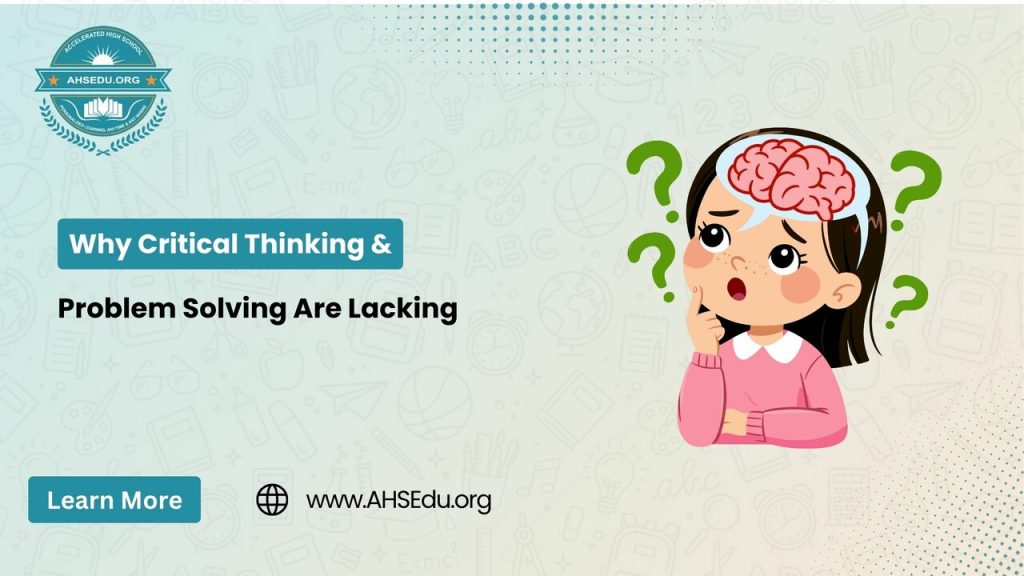
Across the world, many school systems still emphasize memorization, textbook drills, and standardized testing over skills like analysis, evaluation, creative problem-solving, and metacognitive thinking. Yet educators increasingly agree that these higher-order skills are essential for students to thrive in the 21st century.
As one EdWeek commentary explains, teaching students how to think critically helps them “turn information into knowledge and knowledge into wisdom.” Another source argues that critical thinking fosters independence in learning and deeper engagement with content. Yet, despite that consensus, many curricula still fall short. Schools often feel pressure to “cover” large volumes of content, leaving little room for discussion, inquiry, or deeper reflection. Some teachers, constrained by tight pacing guides and testing mandates, skip open-ended questions or eliminate class time for thinking routines.
Meanwhile, students increasingly report difficulty applying what they learn. They can memorize facts but struggle to:
• Analyze complex texts or arguments
• Apply math or science knowledge to real-life problems
• Recognize bias, question assumptions, and make reasoned decisions
• Reflect on their own thinking and learning strategiesA growing body of research supports concern. For example, Project Zero’s Visible Thinking initiative has shown that short question routines (like See, Think, Wonder) integrated across subjects help students internalize habits of inquiry and deeper thinking. Moreover, a study in a large classroom found that problem-based learning (PBL) without a tutor significantly improved general problem-solving ability. Though that study was not in elementary settings, it indicates that structured thinking tasks can enhance reasoning ability.
When curricula neglect these skills, students may pass tests but remain ill-prepared for future challenges jobs, civic life, or unpredictable global changes like AI, climate change, or shifting economies. In fact, a national survey of educators found that a real-world problem-solving approach to math and science is essential, not optional. Failure to teach critical thinking also contributes to the global learning crisis: even when students are in school, many fail to master foundational skills because they never practice thinking beyond rote tasks.
How to Build Thinking Skills (and Why It Works)
To counter these gaps, educators often adopt strategies such as:
• Visible thinking routines (e.g. See, Think, Wonder, Connect, Extend, Challenge) that prompt students to slow down, observe, ask questions, and reflect.
• Socratic questioning or guided inquiry: teachers ask probing questions to push deeper reasoning.
• Problem-based learning (PBL) and project-based learning, where students explore real, open-ended problems and must research, iterate, and present solutions.
• Metacognitive reflection: explicitly teaching students to think about how they think, monitor their own strategies, and adjust.
• Frequent low-stakes tasks that require justification of reasoning, comparing multiple approaches, and explaining thinking, rather than only practicing procedures.These strategies, when embedded across subjects, nurture intellectual habits. The challenge is scaling them and supporting teachers to adopt them consistently.

Why AHS Education Is Designed to Fill This Gap
AHS Education was built not just to deliver content, but to cultivate thinking skills within its structure. Here’s how:
In every lesson, AHS weaves in questions and prompts that invite students to analyze examples, compare methods, and reflect on their reasoning. This helps learners move beyond rote mastery into deeper understanding.
Because students advance at their own pace, AHS frees up time for deeper inquiry rather than rushing through content. Students who grasp basic topics can explore extensions, while others can revisit concepts until they truly understand.
Unlike simple drills, AHS offers practice problems where students not only compute but also justify their steps or choose among strategies. That encourages metacognitive thinking and helps students internalize reasoning—not just answers.
The platform provides dashboards that encourage students to reflect: which areas are strong, which are weak, and what strategies they used. Showing growth over time helps students see thinking as a process—not a fixed trait.
For classrooms or tutoring programs using AHS, prompts and teacher guides suggest thinking routines, scaffolded questioning, or discussion strategies aligned to each skill. This helps educators coach thinking, not just assign content.
Because AHS is free or low-cost (demo or free trial), it removes barriers to access. Schools, non-profits, parents, and tutors can all use the platform without needing to redesign curriculum. This democratizes access to rich thinking content.
Real Impact: What Teachers & Students Can Expect
• Stronger reasoning and argumentation: Students learn to explain why a method works, not just execute it.
• Greater transfer: Thinking skills used in math or science can carry into reading, history, or civic reasoning.
• Increased student ownership: Reflective learners begin to ask their own questions, check assumptions, and revise their work.
• Resilience for unknown futures: In a fast-changing world, knowing how to think matters more than knowing facts.Early pilot tests in settings using thinking-rich curricula show gains in both content learning and overall intellectual habits. (E.g. PBL studies, visible thinking research)
Tips for Schools, Non-Profits, Tutors & Parents to Start Improving Thinking
Critical thinking and problem-solving aren’t optional extras, they are essential for preparing students to navigate a complex, uncertain future. Yet many curricula still treat them as afterthoughts.AHS Education bridges that gap by embedding inquiry, reflection, and reasoning inside a robust curriculum. Whether you’re a parent, tutor, non-profit, or school leader, you can bring this transformation to your learners today.Ready to help learners think better—not just learn more?
Sign up for free at AHS and experience a curriculum where every student becomes a thinker:
Parents → AHSEdu.org/demo-for-parents
Non-profits → AHSEdu.org/demo-for-nonprofit
Schools / Institutes → AHSEdu.org/demo-for-institute
Tutors → AHSEdu.org/demo-for-tutor
Give your learners the tool not just to remember but to reason, question, and create. Start now.

AHSEDU.org offers personalized learning for every student. With a curriculum standardized with USA State Standards, Free interactive videos, Fun and interactive learning content, Constructive assessments, and take-home worksheets we address the unique educational needs of each learner to ensure success.